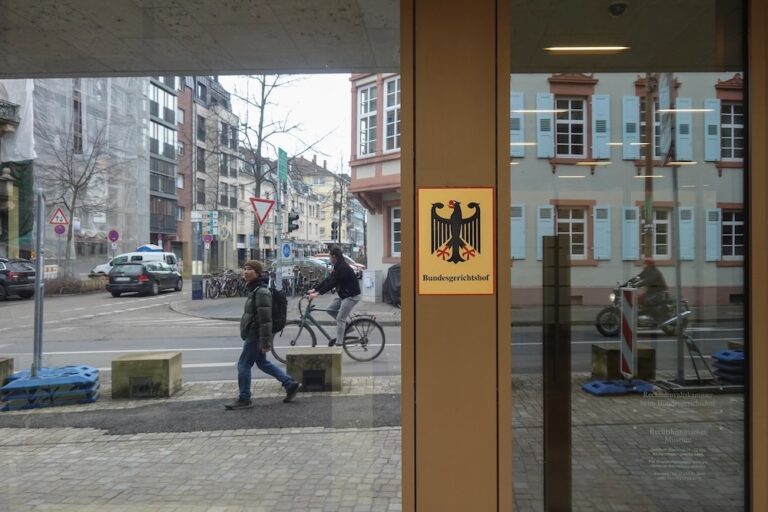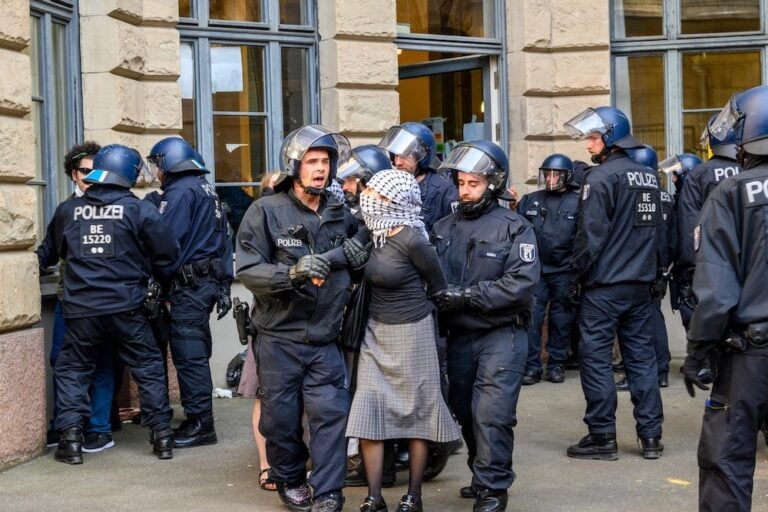(IPI/IFEX) – VIENNA, 23 April 2009 – A group of German journalists, lawyers and doctors today filed a complaint before the Federal Constitutional Court against a controversial law that greatly increases the power of the police to conduct secret surveillance of citizens. The law – which has been in force since 1 January and is […]
(IPI/IFEX) – VIENNA, 23 April 2009 – A group of German journalists, lawyers and doctors today filed a complaint before the Federal Constitutional Court against a controversial law that greatly increases the power of the police to conduct secret surveillance of citizens.
The law – which has been in force since 1 January and is already the subject of one unresolved complaint – contains provisions that could potentially weaken journalists’ right to protect the confidentiality of their sources.
Known as the Law on the Defence against the Dangers of International Terrorism through the Federal Criminal Police, or the BKA law by its German initials, the measure was introduced to aid the federal police in their fight against terrorism. It gives the authorities new surveillance powers, including the right to conduct secret, remote searches of private computers through the Internet.
“Since the BKA law came into force, journalists in Germany can no longer guarantee confidentiality to their sources”, said IPI Director David Dadge. “This will severely undermine the capacity of the media to conduct investigative reporting and it endangers Germany’s fine reputation for supporting press freedom. I hope that the court recognises this, and holds that the law is unconstitutional in its current form”.
Among those who filed today’s complaint is the award-winning television correspondent Christoph Maria Froehder, as well as Michael Naumann, a publisher of the Die Zeit broadsheet.
Michael Konken, chairman of the German Journalists Association (DJV), supported the complaint in a statement to IPI. “The BKA law infringes in an irresponsible way on editorial independence and the protection of sources”, Konken said.
The 54-page complaint refers frequently to the damage the law could inflict on the professional confidentiality requirements of doctors, lawyers and journalists. One of the complainants identified in the document as an “independent journalist” expressed fears that the law could expose journalists to retaliation from sources who feel that their confidentiality has been breached.
The complaint also states that the BKA law clashes with the safeguards to media freedom and the free flow of information enshrined in the Federal Constitution, as whistleblowers will now be less likely to come forward with information for fear of exposure.
This is the second time a complaint has been filed at Karlsruhe against this law. On 27 January another German journalist, Bettina Winsemann, filed a similar complaint which is still ongoing.
In a February interview with IPI, Winsemann’s lawyer, Fredrick Roggan, stated that journalists can no longer be sure they are not being investigated, as editorial offices holding content relevant to terrorism can be searched. “Normally, you would have to exempt journalists from such surveillance,” said Roggan. “The BKA law, though, doesn’t do this.”
Despite much criticism of the BKA law, reports have surfaced in recent weeks of government plans to widen the use of surveillance by amending the criminal code to include similar provisions.
However, Justice Minister Brigitte Zypries has publicly stated that no such changes will be considered until the ongoing complaints at Karlsruhe have been resolved.
Updates alerts on the anti-terrorism law: http://ifex.org/en/content/view/full/98956


